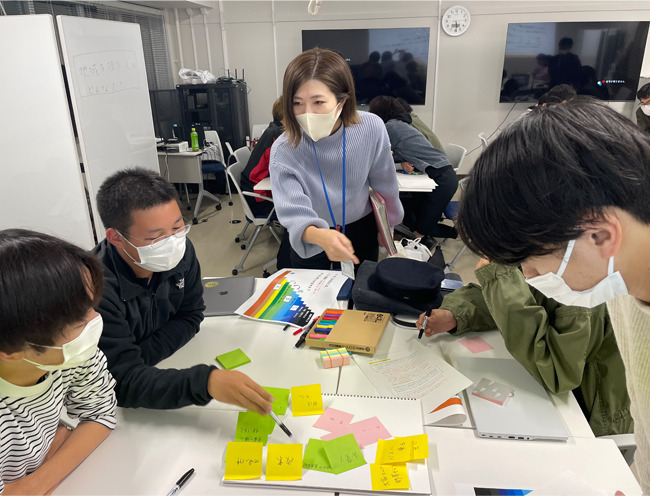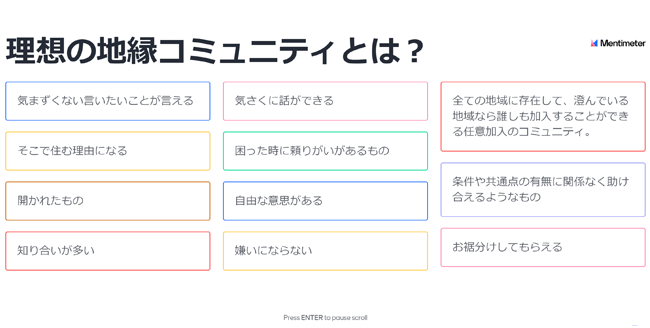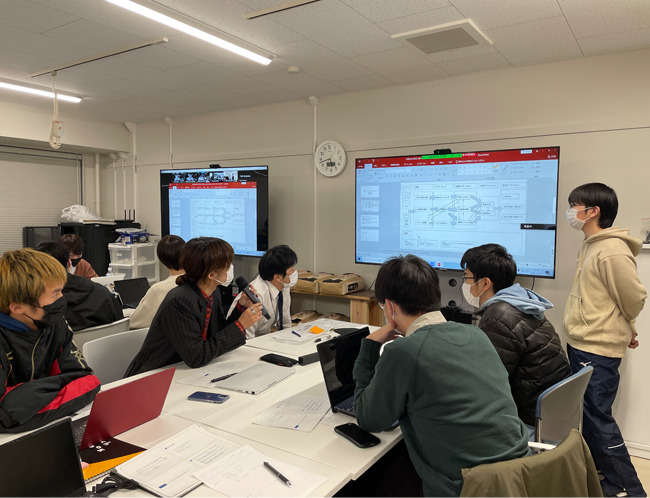The points are group work and active learning
The common theme of all 15 lectures is "community".While deepening the understanding of the local community in Shiojiri City, students will learn how to obtain materials that are indispensable for fieldwork, interview methods, questionnaire creation methods, and effective tools in a lecture format.Next, through fieldwork, we constructed an "ideal logic model of the local community" after grasping the current situation of the local community in Shiojiri City.From there, it was a series of lessons to think about the gaps and problems between the current situation and the ideal, and to make a business proposal to Shiojiri City that the students themselves would eventually lead to better community policies.
In the first half, based on the theme of "local community", which is not familiar to students, we grasped the image of the local community based on familiar themes such as "local events and festivals that we participated in when we were children". However, each person conducted a preliminary survey of Shiojiri City.In addition, on-site lectures by city hall staff were also held to learn about the current state of vitality of local communities such as residents' associations in recent years and the government's efforts toward community development.
Not limited to this on-site lecture, the staff in charge of the Planning Division of the Shiojiri City Planning Policy Department and the Community Development Division of the Citizen's Lifestyle Division participated in the lecture every time and were actively involved with the students. It also seems to have helped to deepen the relationship.

After that, in addition to lecture-type lessons, we carry out active learning called group work.Students are divided into 4 groups of about 4 people each time, and discussions are held on themes such as "how to take an interest in the community and regard it as one's own thing", "what to pay attention to during fieldwork", and "creating an ideal community". After accumulating opinions, the proposals of multiple people were selected and completed as one opinion.By making a final presentation, I gained the ability to think and deepen my understanding, and learned a problem-solving method that emphasizes individual ideas and ideas rather than general answers.
In addition, "In this class, we also emphasized the aspect of acquiring the ability to verbalize one's thoughts and convey them to the other party," says Assistant Professor Naoko Nishio, who was in charge of the class.Group work, in which a small number of people actively exchange discussions, is part of this.On the other hand, "Mentimeter" is a tool that allows students to get the thoughts of students who tend to hesitate to speak in front of a large number of people, and to anonymously collect their opinions, questions, and awareness in real time using a smartphone or tablet during class. ".The thoughts received were immediately projected on the screen of the classroom, which created an opportunity for remarks, making it easier for discreet students to participate in the lesson.

Students take turns writing reports for each course.Students also decided on the responsibility, and by posting the written report on the website of the "ENGINE" program, the mood for students to take the initiative in class was naturally fostered.As a result, Assistant Professor Nishio recalls that the feeling of growth in the verbalization ability of the students was one response.
Build a logic model from real-world learning
In the first half of the fieldwork, all the students heard about the efforts of local residents in Narai Ward and Soga District, which are developing advanced self-government led by residents in Shiojiri City.In the second half, students plan their own places to investigate in group units, and conduct research activities to visit local facilities of interest, such as the Citizens' Exchange Centers "Empaku" and "Enterasu" and the Civic Innovation Base "Snava". did.
"It was a valuable opportunity for students to hear the voices of the local staff and the residents who create the local community through the actual lessons and fieldwork, which led to a lot of learning for the students," said Assistant Professor Nishio.In the submitted student report, there is a description that "I was able to feel the local issues with my skin and learned the shape of the community from various perspectives", and how the residents were aware of the problems. It was felt that the students became more interested in Shiojiri City and took the task as their own by knowing whether they took action.

After the fieldwork, lectures were given with an emphasis on assembling the logic model based on the knowledge gained there and the current situation.A logic model can understand the whole picture by systematically illustrating the path to realize the effect, and it is also useful for project proposal / design, and it is possible to evaluate the purpose and the steps to reach it. It is a tool that allows you to know why the project was achieved / not achieved.On top of that, it also plays a role in thinking about further final goals that are ahead of the achievement of the goals.
Mr. Hiroki Arakawa, the representative of Next Public Health Lab, who is an outside lecturer, gave a lecture on this logic model.We are developing a logic model business for community development through industry-government-academia collaboration, and have actually made business proposals related to logic models in Shiojiri City with Shinshu University students and graduate students.Classes that make use of that experience clarified the image that "students create an ideal logic model for local community activities in Shiojiri City."Also, the advice from an experienced point of view would have deepened the student's understanding of the logic model.
Based on this learning, the students created a logic model from the knowledge gained through fieldwork.On that basis, the background of each individual and the feelings unique to young people were also incorporated into the logic model, and the ideal form of local community activities and proposals for revitalizing local communities were put together in the final presentation in units of four groups.


